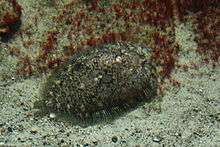Zeugopterus punctatus
| Zeugopterus punctatus | |
|---|---|
 | |
| Topknot (Z. punctatus) | |
| Scientific classification | |
| Kingdom: | Animalia |
| Phylum: | Chordata |
| Class: | Actinopterygii |
| Order: | Pleuronectiformes |
| Family: | Scophthalmidae |
| Genus: | Zeugopterus |
| Species: | Z. punctatus |
| Binomial name | |
| Zeugopterus punctatus Bloch, 1787) | |
| Synonyms[1] | |
|
Pleuronectes punctatus | |
Zeugopterus punctatus, the common topknot, is a species of left eyed flatfish in the family Scophthalmidae, from the eastern Atlantic Ocean.
Description
Zeugopterus punctatus is a small left-sided flatfish that is almost completely round in shape, with a broad body relative to its length. It is a mottled brown and white colour with light wide fins all the way round and has a very small tail, unlike most other flatfish, it does not seem to change colour for camouflage but relies on immobility to avoid detection. Zeugopterus punctatus grows to a maximum length of abour 25 cm. It is sometimes confused with the lemon sole Microstomus kitti which can be found I rocky substrates too but has a noticeable pattern on its back, does not have such long fins and is a more pointed shape.[2]
Distribution
The eastern Atlantic Ocean including the North Sea, Baltic Sea, English Channel, Bay of Biscay south to the coast of Portugal.[3]
Habitat
Rocky coastlines, Zeugopterus punctatus is unusual among European flatfish in that it prefers a rocky substrate. It has the ability to remain immobile in the most surprising sites, holding on to vertical rocks or even upside down under overhangs. This is achieved by using its broad fringing fins to fit itself into the substrate.
Food
Crustaceans, marine worms, shellfish and very small fish.[4]
References
| Wikimedia Commons has media related to Zeugopterus punctatus. |
- ↑ "WoRMS taxon details Zeugopterus punctatus (Bloch, 1787)". marinespecies.org.
- ↑ "British Marine Life: Common Topknot - Zeugopterus punctatus". Oceaneyephoto.com. Retrieved 2016-05-25.
- ↑ "Ocean Biogeographic Information System". Iobis.org. Retrieved 2016-05-25.
- ↑ "Topknot". Britishseafishing.co.uk. Retrieved 2016-05-25.